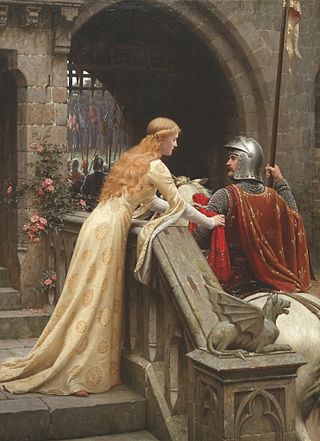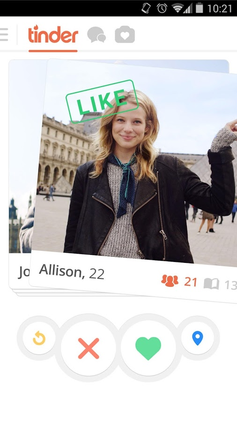Related Research Articles

Online dating, also known as internet dating, virtual dating, or mobile app dating, is a method used by people with a goal of searching for and interacting with potential romantic or sexual partners, via the internet. An online dating service is a company that promotes and provides specific mechanisms for the practice of online dating, generally in the form of dedicated websites or software applications accessible on personal computers or mobile devices connected to the internet. A wide variety of unmoderated matchmaking services, most of which are profile-based with various communication functionalities, is offered by such companies.

Matchmaking is the process of matching two or more people together, usually for the purpose of marriage, in which case the matchmaker is also known as a marriage broker. The word is also used in the context of sporting events such as boxing, in business, in online video games and in pairing organ donors.

Courtship is the period wherein some couples get to know each other prior to a possible marriage or committed romantic, de facto relationship. Courtship traditionally may begin after a betrothal and may conclude with the celebration of marriage. A courtship may be an informal and private matter between two people or may be a public affair, or a formal arrangement with family approval. Traditionally, in the case of a formal engagement, it is the role of a male to actively "court" or "woo" a female, thus encouraging her to understand him and her receptiveness to a marriage proposal.
A dating agency, also known as a marriage bureau, marriage agency, matrimonial bureau or matrimonial agency, is a business that provides matchmaking services to potential couples, with a view toward romance and/or marriage between them.
In mathematics, economics, and computer science, the stable marriage problem is the problem of finding a stable matching between two equally sized sets of elements given an ordering of preferences for each element. A matching is a bijection from the elements of one set to the elements of the other set. A matching is not stable if:

eHarmony is an online dating website launched in 2000. eHarmony is based in Los Angeles, California, and owned by ParshipMeet Group, a joint venture of German mass media company ProSiebenSat.1 Media and American private equity firm General Atlantic.

OkCupid is a U.S.-based, internationally operating online dating, friendship, and formerly also a social networking website and application. It features multiple-choice questions to match members. Registration is free. OkCupid is owned by Match Group, which also owns Tinder, Hinge, Plenty of Fish, and many other popular dating apps and sites.
Match.com is an online dating service with headquarters are in Dallas, Texas. The company has offices in Dallas, West Hollywood, San Francisco, Tokyo, Rio de Janeiro, and Beijing. Match.com is owned by Match Group, which owns several online dating services.

Dating is a stage of romantic relationships in which two individuals regularly engage in activity together, most often with the intention of evaluating each other's suitability as a partner in a future intimate relationship. It falls into the category of courtship, consisting of social events carried out by the couple either alone or with others.

Alvin Eliot Roth is an American academic. He is the Craig and Susan McCaw professor of economics at Stanford University and the Gund professor of economics and business administration emeritus at Harvard University. He was President of the American Economic Association in 2017.
In mathematics, economics, and computer science, the Gale–Shapley algorithm is an algorithm for finding a solution to the stable matching problem. It is named for David Gale and Lloyd Shapley, who published it in 1962, although it had been used for the National Resident Matching Program since the early 1950s. Shapley and Alvin E. Roth won the 2012 Nobel Prize in Economics for work including this algorithm.

Tinder is an online dating and geosocial networking application launched in 2012. On Tinder, users "swipe right" to like or "swipe left" to dislike other users' profiles, which include their photos, a short bio, and some of their interests. Tinder uses a "double opt-in" system, also called "matching", where two users must like each other before they can exchange messages.

Operation Match was the first computer dating service in the United States, begun in 1965. The predecessor of this was created in London and was called St. James Computer Dating Service, started by Joan Ball in 1964.
This timeline of online dating also includes broader events related to technology-assisted dating. Where there are similar services, only major ones or the first of its kind are listed.
An online dating application, commonly known as a dating app, is an online dating service presented through a mobile phone application. These apps often take advantage of a smartphone's GPS location capabilities, always on-hand presence, and access to mobile wallets. These apps aim to speed up the online dating process of sifting through potential dating partners, chatting, flirting, and potentially meeting or becoming romantically involved.

Hinge is an online dating application. The app displays potential matches one at a time and allows the user to dismiss or attempt to match by responding to a specific piece of content on their profile. The service emphasizes uploading user-generated content in a variety of formats, such as photos, videos, voice recordings, and "prompts" as a way to express personality and appearance. The app is fully owned by Match Group as of February 2019.
S'More was a dating app developed by Something More Inc. It was considered to be an anti-superficial dating app. Profile photos were revealed over time only after a person has indicated interested in a person via interacting with their profile.
Course allocation is the problem of allocating seats in university courses among students. Many universities impose an upper bound on the number of students allowed to register to each course, in order to ensure that the teachers can give sufficient attention to each individual student. Since the demand for some courses is higher than the upper bound, a natural question is which students should be allowed to register to each course.
The News Literacy Project (NLP) is an American nonpartisan national education nonprofit, based in Washington, D.C., that provides resources for educators, students, and the general public to help them learn to identify credible information, recognize misinformation and disinformation, and determine what they can trust, share, and act on. It was founded in 2008 by Alan C. Miller, a Pulitzer Prize-winning investigative reporter at the Los Angeles Times Washington bureau.
Logan Ury is an American behavior expert, author, and dating coach who may be best known for her book How to Not Die Alone.
References
- 1 2 3 4 Xiang, Teo Kai (2024-07-06). "Falling out of love with dating apps? Young singles switch to events, other algorithms, old tricks". The Straits Times. ISSN 0585-3923. Archived from the original on 6 July 2024. Retrieved 2024-09-01.
- 1 2 3 4 5 6 Kelley, Tess C. (11 February 2021). "Love at First Match | Magazine | The Harvard Crimson". www.thecrimson.com. Retrieved 2024-09-01.
- ↑ Alexa, DiFranesco (2022-02-13). "What's new to the Aphrodite Project in 2022". The Varsity. Retrieved 2024-09-01.
- ↑ Abernethy, Sarah (2021-02-16). "Aphrodite's algorithm: students reflect on matchmaking with AI". The Strand. Retrieved 2024-09-01.
- ↑ Sagna, Michael (2019-10-26). "From Arrow to Algorithm: The Aphrodite Project Could Find You True Love". The Octant. Retrieved 2024-09-01.
- ↑ Reiner, Veronica (2024-02-16). "Find love at UW, the UW way | Imprint". UW Imprint. Archived from the original on 2024-02-16. Retrieved 2024-09-01.
- 1 2 3 Prete, Emily (2023-02-13). "The Aphrodite Project connects U of T students for a fourth year - The Medium" . Retrieved 2024-09-01.
- 1 2 Alsaigh, May (2022-02-14). "The Aphrodite Project returns for another year - The Medium". The Medium. Retrieved 2024-09-01.
- ↑ Low, Nadya (2022-01-28). "Dating in the Era of Dating Apps: The Quest for Meaningful Connections". NUSSU The Ridge Magazine. Retrieved 2024-09-01.
- ↑ How, Mandy. "Dating project for NUS & Yale-NUS students uses Nobel Prize-winning algorithm to find 1 ideal match". mothership.sg. Retrieved 2024-09-01.
- ↑ Lam, Adam; Pereira, Ana (2020-07-07). "How a matchmaking algorithm paired up thousands of hopeless U of T romantics". The Varsity. Retrieved 2024-09-01.
- ↑ MacDonald, Geoff (April 10, 2019). "Geoff MacDonald". Department of Psychology.
- 1 2 3 McCambridge, Nina (2024-02-12). "Aphrodite Project relaunches annual match program at CMU". The Tartan. Retrieved 2024-09-01.
- 1 2 3 "Falling out of love with dating apps? Young singles switch to events,..." archive.md. 2024-07-06. Retrieved 2024-09-01.
- ↑ "Scott Duke Kominers - Faculty & Research - Harvard Business School". www.hbs.edu.